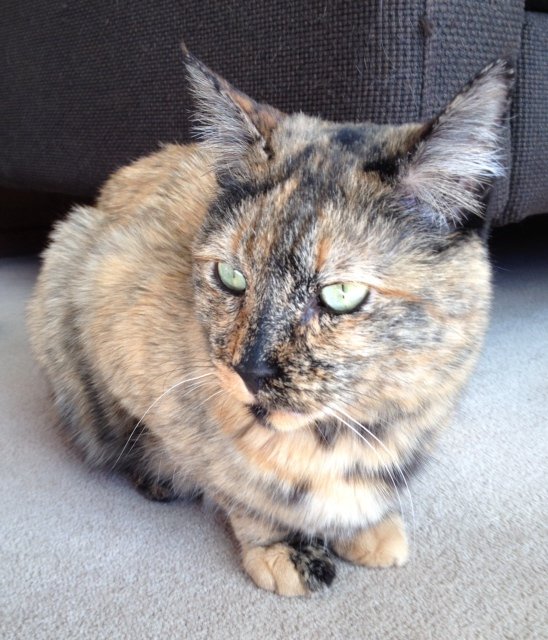I have a 5 yo female tortie recently adopted from the local humane society. For the past three weeks Stella has been pooping sporadically every 2-5 days, and dragging her butt across the new Ikea couch. The poop consistently is VERY hard and dry. She's been eating a 5.5 ounce can of high quality chicken wet food (hounds & gatos, great life essentials, felidae) per day. She's well-hydrated and pees often. I tried laxatone and even adding a tsp of pumpkin to each meal, but to no avail.
X-rays at the vet indicated she was impacted. The vet squeezed her anal glands (they were empty) and gave her an enema. The vet felt her issues were related to the high protein, low carb/grain chicken wet food that I was feeding, and prescribed Hills Z/D. Needless to say I was mortified.
Now I eat mostly paleo myself and based on the literature I've read here and elsewhere, felt my cat should be doing the same. I read the ingredients of the Z/D and vomited in my mouth:
Hydrolyzed Chicken Liver, Water, Corn Starch, Soybean Oil, Powdered Cellulose, Calcium Carbonate, DL-Methionine, Potassium Chloride, Dicalcium Phosphate, Choline Chloride, vitamins (Vitamin E Supplement, Thiamine Mononitrate, Ascorbic Acid (source of vitamin C), Niacin Supplement, Pyridoxine Hydrochloride, Calcium Pantothenate, Vitamin B12 Supplement, Riboflavin Supplement, Biotin, Vitamin D3 Supplement , Folic Acid), Iodized Salt, Taurine, Calcium Sulfate, minerals (Zinc Oxide, Ferrous Sulfate, Manganous Oxide, Copper Sulfate, Calcium Iodate, Sodium Selenite), Beta-Carotene
So my questions:
1. Are food allergies in felines mostly related to a single protein source (ie. chicken), and I could potentially try another protein source such as lamb?
2. How long does it typically take to see changes in behavior and bodily functions after allergens are removed from the diet?
3. Anyone else have a similar experience with chicken in canned food? It seems like chicken (and fish) are the top protein sources used in cat foods.
Thanks!
X-rays at the vet indicated she was impacted. The vet squeezed her anal glands (they were empty) and gave her an enema. The vet felt her issues were related to the high protein, low carb/grain chicken wet food that I was feeding, and prescribed Hills Z/D. Needless to say I was mortified.
Now I eat mostly paleo myself and based on the literature I've read here and elsewhere, felt my cat should be doing the same. I read the ingredients of the Z/D and vomited in my mouth:
Hydrolyzed Chicken Liver, Water, Corn Starch, Soybean Oil, Powdered Cellulose, Calcium Carbonate, DL-Methionine, Potassium Chloride, Dicalcium Phosphate, Choline Chloride, vitamins (Vitamin E Supplement, Thiamine Mononitrate, Ascorbic Acid (source of vitamin C), Niacin Supplement, Pyridoxine Hydrochloride, Calcium Pantothenate, Vitamin B12 Supplement, Riboflavin Supplement, Biotin, Vitamin D3 Supplement , Folic Acid), Iodized Salt, Taurine, Calcium Sulfate, minerals (Zinc Oxide, Ferrous Sulfate, Manganous Oxide, Copper Sulfate, Calcium Iodate, Sodium Selenite), Beta-Carotene
So my questions:
1. Are food allergies in felines mostly related to a single protein source (ie. chicken), and I could potentially try another protein source such as lamb?
2. How long does it typically take to see changes in behavior and bodily functions after allergens are removed from the diet?
3. Anyone else have a similar experience with chicken in canned food? It seems like chicken (and fish) are the top protein sources used in cat foods.
Thanks!
Last edited:

